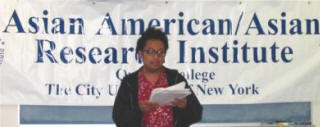
Aftermath
By Meena Alexander
There is an uncommon light in the sky
Pale petals are scored into stone.
I want to write of the linden tree
That stoops at the edge of the river
But its leaves are filled with insects
With wings the color of dry blood.
At the far side of the river Hudson
By the southern tip of our island
A mountain soars, a torrent of sentences
Syllables of flame stitch the rubble
An eye, a lip, a cut hand blooms
Sweet and bitter smoke stains the sky.
(New York City, September 13-18, 2001)
Copyrighted Meena Alexander
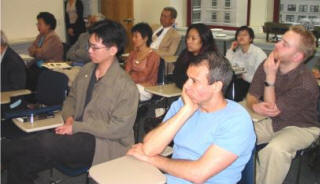
Invisible City
By Meena Alexander
Sweet and bitter smoke stains the air
The verb stains has a thread torn out
I step out to the linden grove
Bruised trees are the color of sand.
Something uncoils and blows at my feet
Sliver of mist? Bolt of beatitude?
A scrap of what was once called sky?
I murmur words that come to me
Tall towers, twin towers I used to see.
A bloody seam of sense drops free.
By Liberty Street, on a knot of rubble
In altered light, I see a bird cry.
(New York City, October 17-November 3, 2001)
Copyrighted Meena Alexander

Pitfire
By Meena Alexander
In altered light I hear a bird cry.
By the pit, tor of metal, strut of death.
Bird song yet. Liturgie de cristal.
Flesh in fiery pieces, mute sediments of love.
Shall a soul visit her mutilated parts?
How much shall a body be home?
Under these burnt balconies of air,
Autumnal duty that greets us.
At night, a clarinet solo I put on:
Bird song pitched to a gorge, a net of cries.
In the news, a voice caught on a lost line:
‘We’ve even struck the bird’s throat.’
(New York City, November 20-December 5, 2001)
Copyrighted Meena Alexander
Note: The poems ‘Aftermath’ and ‘Invisible City’ first saw the light of day on December 7, 2001 when I took part in the panel discussion ‘Artist in a Time of Crisis’ They are part of the exhibit ‘Time to Consider: The Arts Respond to 9/11’
In the poem ‘Pitfire’ ‘Liturgie de cristal’ is Olivier Messaien’s phrase. I have taken it from his preface to Quatuor pour la fin de temps, Part 1. The clarinet solo is Part 3 (abime des oiseaux).
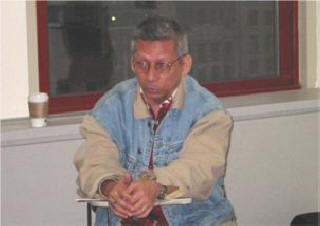
Coup D’etat
By Luis H. Francia
Think of your lives as leaves,
One life, one leaf
Each death a fall off a tree.
Ponder your veins, the network
That feeds you. One day the
Roads will be blocked, traffic stopped
And some voice will shout above the din
Or whisper, elections are over,
The state dissolved.
No one’s in command now.
The guards will come down
From the watchtowers, officers
In backrooms will shred the files,
And all the citizens of you
Will know it’s time to go,
In quick or slow
Exodus, in graceful fall
Or plummet plunge-
A furious leavetaking.
Partaker of what soil had to
Offer, the soil now offers you.
Be neither happy nor sad,
All of you, though some should
Rejoice, who will for once be of use:
Mulch, grub to the tiny and the many,
Those whom you buried will now bury you.
Copyrighted by LH Francia
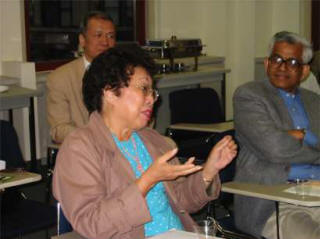
WHAT PICASSO AND GAUGUIN WOULD HAVE SEEN ON THE SEVEN TRAIN
By Luis H. Francia
I.
Throughout its steely length an empire
crowds together, the globe circumscribed
in those odd miles from Flushing to Times Square:
Morning, mobile and marching.
Wired on dreams, through
the stitch and thread of fabulous rags,
They ready themselves for
offertories of bucket and wastepaper basket,
search computers for signs of the sacred,
and look upon the cursor as
the god of invisible things
II.
In those packed cars he would have
cut them all, arms lifted from shoulders,
curves angled to grasp the skull.
A nose looks, eyes listen, ears perch like birds
At Grand Central, Times Square, the crowd
alights, lines explode in search
of history, mass and tauromachy in motion:
The canvas according to Pablo.
The canvas according to Paul:
He casts the Seven,
roaring to a halt where he sits,
as an isle afloat in a
constellation, skyscrapers a row of palm
trees, bull’s head now a livid moon
dusk face, sun limb, flowers of
women’s bodies, reassembled, whole:
Histories condensed in search of line.
III.
From canvas to canvas the
Seven winds its way, iron artery
bearing the city’s red blood cells,
each worker a secret Moctezuma
bent on retaking the New World,
enduring Manhattan’s scrutiny that
each day memorizes and each night forgets their faces.
Burnished, murmurous, ever since first
foot fell, fled, forced out of place, O voyager
fierce, fed on desire, turn your ploughs
into shares, your lives into knives
compacted and diffuse.
Always your dead are never far
remembering, and never letting go of the night
Copyrighted by LH Francia, 2001
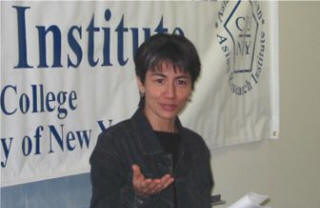
After Seeing Our First-graders Off
By Kimiko Hahn
Carla and I would sometimes sip coffee
in the diner window seat
to watch the firefighters
lumber by in their large gear.
Not to flirt or fantasize really–
we were admiring them,
even as they shopped in a grocery
like so many fussy old ladies
organizing a Sunday social. And today,
I realize it was the excitement
of small girls seeing a rock star
or dapper uncle.
Wanting a kiss on the cheek. A wink.
Wishing to blush at a power
reserved for fathers. This
was my small association with
that neighborhood Engine Company
until yesterday when I heard from my neighbor,
also a firefighter, that you are all lost.
And I am full of a queasy emptiness
that all I can do is donate blood
and offer words of condolence,
such impossible rescue tools.
Such pitiful tools for thanks.
Originally published in Heyen, William, ed., September 11, 2001: American Writers Respond (Silver Springs, MD: Etruscan Press, 2002). Reprinted permission of author.
Her Very Eyes
By Kimiko Hahn
A friend’s sister, my daughter reports,
cannot close her eyes,
and I interrupt, it must be asbestos irritation–
until she adds,
she sees bodies falling from the sky,
she sees bodies breaking through the glass atrium
or smashing onto the pavement,
she sees one woman, her skirt billowing out like a mannequin,
and a suited man plunging headfirst.
And she hears them land in front of her
but cannot turn away when she closes her eyes.
And she doesn’t know what to do.
This is what my daughter reports
upon coming home from school
last Tuesday.
Originally published in The Clarion: newspaper of the Professional Staff Congress/CUNY, Oct. 2001; reprinted permission author
After Forty-eight Hours
By Kimiko Hahn
the wife of a rescue worker
from that first maneuver
finds a son’s transit pass, brushes
a daughter’s hair, braids her hair,
slaps together a couple pb&j–
and believes her husband
lies under metal, concrete, glass, chairs, desks,
fax machines, souvenirs–
with a pulse. She waves
bye to their children,
late for school, and sits down
to collapse
for a second
then stand again
for the ordinary.
Originally published in The Clarion: newspaper of the Professional Staff Congress/CUNY, Oct. 2001; reprinted permission author
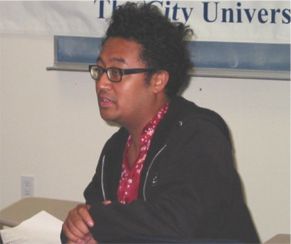
Office In The Small City
By Regie Cabico
I am jealous of the sky
expanding and expanding
breathe in, breathe out
a metropolis
oblivious to collisions
Fame slams against
the tall white building
Money runs out
like a cab ride to nowhere
In this hour
I have lost everything
Not even this blue
in its most
opulent light
can forgive me
